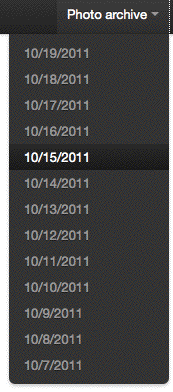
 OccupyWallStreet a new Napster?
OccupyWallStreet a new Napster? 
 It would be interesting to talk to some people who were music industry execs in they heyday of Napster to see if they have any regrets about breaking it. Some of us at the time said that they should legitimize it, clean it up, upgrade it, and charge for access to high resolution versions of the music while letting out low-rez scans for free. It would have been a blow to their egos, to be dragged into a new market by users. But I argued that for the first time in a very long time, people were truly excited about music. People were talking about Napster in supermarkets, on airplanes, at dinner parties. Why? Because for the first time they could program their own music. This turns out to have been a very powerful thing. We were just getting our first taste of it back in 2000.
It would be interesting to talk to some people who were music industry execs in they heyday of Napster to see if they have any regrets about breaking it. Some of us at the time said that they should legitimize it, clean it up, upgrade it, and charge for access to high resolution versions of the music while letting out low-rez scans for free. It would have been a blow to their egos, to be dragged into a new market by users. But I argued that for the first time in a very long time, people were truly excited about music. People were talking about Napster in supermarkets, on airplanes, at dinner parties. Why? Because for the first time they could program their own music. This turns out to have been a very powerful thing. We were just getting our first taste of it back in 2000.
There are a lot of parallels between the excitement of Napster in 2000, and the excitement today around OccupyWallStreet. For the first time in a long time we're talking about politics without complete resignation. We have some sense that we may be able to get something done. And of course the politicians, as were the music execs, are offended. Why? Because this wasn't their idea? Because the people are leading? Because they don't know where it will lead? Most likely: Because it breaks all the patterns in politics they've become accustomed to.
In 2000, all the music and all the users were in a single tent. It would have been easy to build the music distribution system of the future. A handful of programmers in Silicon Valley had done just that. Users were happy to live with the limits of Napster as long as they could program their own music.
If the parallels are real, then the city management of Denver just blew it. Do they think for a minute that by shutting down OccupyDenver, in a way that's so humiliating to the people who were brave enough to break the rules, that they're going to stop the movement? It's pretty doubtful. They just forced it out of sight. Instead, imagine if they had worked with them, to help them build their political movement, not knowing where it was going, but taking a chance that it might break us out of the mediocrity that we've become mired in. Instead of standing in the way, not only get out of the way, but try to help out. See if there isn't a way for everyone to get what they want.
 OccupyWeb photo archive
OccupyWeb photo archive 
 Even though the photos on occupyweb.org scroll by quickly, the app behind the website has been keeping an archive of the photos. I was hoping to find the time to write the code to archive them in a browsable way. Now I've got that working.
Even though the photos on occupyweb.org scroll by quickly, the app behind the website has been keeping an archive of the photos. I was hoping to find the time to write the code to archive them in a browsable way. Now I've got that working.
Here's how to get to the archive...
You'll see in the upper-right corner of the home page, there's now a dropdown menu. In the menu, in reverse-chronologic order, is a list of the days we have archived. There's a screen shot of the menu to the right.
The pages are fairly huge, some with as many as 1500 pictures. All of them are linked to the Flickr page, so you can find the photographer, and see what the licensing terms are. Or leave a comment.
Why look through the archive? The pictures are great, and they document something that's pretty amazing, over wide distances, which would not be possible without the Internet. And you can see the creativity of the people who are protesting and the photographers who are recording the events. There's some wonderful art and history in these pictures. May be worth spending some time with. I plan to, myself. ![]()
 Money
Money 
Some people say we should take our money out of the big banks.
This is part of a larger discussion about the lives we live, and the scale of the human species. It's the largest discussion we can have as long as we limit ourselves to our presence on this planet.
I tried, when my bank refused to let money flow to Wikileaks, to move from it to another bank. But the new bank was just as bad. Money is defined in terms of those big banks. If you want to break that bond, there are a lot of other bonds you have to break. And when you're done breaking things, you're going to find that the planet can only support a fraction of the human life it now supports. And there will be a lot more sickness, and less cool stuff to read and watch and listen to. You can't just yank the plug on civilization and still have civilization.
We have been here before. The hippies wanted to live off the land. My hippie uncle even did it. He bought some land in a what was then a rural part of Florida and built a geodesic house with no electricity or phone. A bunch of his friends came to live there from New York and Pittsburgh. I went to visit many times, and it was nice. But I always went home to places where I had the full support of modernity.
I couldn't, at this stage of my life, choose a different path. And if I were his age, when he decided to live that way, I wouldn't do it, knowing what I now know.
 Getting back to money. I hear people say we should return to the gold standard, as if gold was some objective form of value. It's no more objective than the money system we have now. If you poke at the reality of money, go through the suspension of disbelief that we all accept its value without understanding where it comes from, you'll realize that it has no value so its value comes from nowhere. Same with gold, same with anything you choose as your "objective" instrument of value. But look at all the substantial real stuff the myth of the value of money has created. That's why the Ron Paul advocates are so totally wrong about the nirvana they imagine. They should think about it this way. Suppose you win, and everyone says OK, let's do it your way. What's the first thing you'd do, and the second and third. Where are we all going to live? What about the money in our bank accounts right now? What will we do with that? How do you turn the clock back to the time we were running on the gold standard? All those people are dead now, so their money doesn't matter, right? And all of our current money is "fiat" money -- yes? So what now?
Getting back to money. I hear people say we should return to the gold standard, as if gold was some objective form of value. It's no more objective than the money system we have now. If you poke at the reality of money, go through the suspension of disbelief that we all accept its value without understanding where it comes from, you'll realize that it has no value so its value comes from nowhere. Same with gold, same with anything you choose as your "objective" instrument of value. But look at all the substantial real stuff the myth of the value of money has created. That's why the Ron Paul advocates are so totally wrong about the nirvana they imagine. They should think about it this way. Suppose you win, and everyone says OK, let's do it your way. What's the first thing you'd do, and the second and third. Where are we all going to live? What about the money in our bank accounts right now? What will we do with that? How do you turn the clock back to the time we were running on the gold standard? All those people are dead now, so their money doesn't matter, right? And all of our current money is "fiat" money -- yes? So what now?
Like it or not, we are dependent on all these things we don't like to keep us alive. There's less room for originality than you were told there was. This is a lie we all come to grips with. When I was young, we marched in the streets because we were so unhappy with the world that was left to us. But ultimately we realized that if we shook it until it broke, we would have nothing left. We have to shake it, for sure -- but we have to keep the old system working while we boot up a new one.
I love the example of the Bay Bridge in San Francisco. A decision was made in the 1990s to replace half the bridge, and rebuild the other half. And all this had to be done while the bridge, which is core to the flow of life in the Bay Area, continued to function. The human species is good at this kind of evolution. And when all is said and done, there will be a new bridge where the old one stood, and the people who travel over it will not remember that there was another bridge here, or care.
 Occupy Election Day, part 2
Occupy Election Day, part 2 
On Sunday I wrote a piece called Occupy Election Day.
The original title of the piece was "Fanning out into neighborhoods."
I thought the new title was more to the point.
An interesting discussion took place in the comments. The same discussion that happens when I bring the idea up on Twitter. People argue that nothing can change in the political process of the United States, or that change is slow and can't happen now. There are lots of ways of expressing this idea. If it's correct, all hope is lost. Because that's the only mechanism for change we have in this country that has a chance of working.
 But things are changing. Already. Because a few hundred people occupy a small piece of lower Manhattan. Paul Krugman noted the same thing in a panel discussion on CNN on Sunday. There were two Republicans and two Democrats. Krugman was one of the Dems. Steve Forbes was one of the Repubs. Krugman pointed out that the Republican themes, which are crazy wrong Depression-inducing ideas, were dominating the whole discussion before OWS came along. Now the topic has shifted, in a productive direction. I agree with Krugman. And I think we should continue in this direction. Of shifting the focus of political discourse. That matters much more than who gets elected in this year's election (to be clear, there is an election on November 8 of this year).
But things are changing. Already. Because a few hundred people occupy a small piece of lower Manhattan. Paul Krugman noted the same thing in a panel discussion on CNN on Sunday. There were two Republicans and two Democrats. Krugman was one of the Dems. Steve Forbes was one of the Repubs. Krugman pointed out that the Republican themes, which are crazy wrong Depression-inducing ideas, were dominating the whole discussion before OWS came along. Now the topic has shifted, in a productive direction. I agree with Krugman. And I think we should continue in this direction. Of shifting the focus of political discourse. That matters much more than who gets elected in this year's election (to be clear, there is an election on November 8 of this year).
Politicians are inkblot-readers. If the inkblot says what they've been doing is wrong, they will change what they're doing. They're much more responsive than you give them credit for.
So, if we were to push the needle just a teeny bit in one direction, any direction, in the 2011 elections, that would set the stage for massive change. If you want power, you have to stop thinking so linearly. Showing power is as good as having power.
So let's find a contest, perhaps in Pennsylvania, Wisconsin, Florida, New Hampshire, Iowa, Nevada, California -- I'm just naming states at random, and influence the election. Not only through marches and occupations, but through door to door canvassing of voters. For the few days remaining between now and November 8, just getting out the vote would be enough of a demo of political power to make a difference. And then let's start planning for Election Day 2012.
This is what money does in politics. If we can substitute people for money, all of a sudden the money matters a lot less.
That's the idea.
PS: Barney Frank is on the same page. He wants to know where we all were for the mid-term elections. We really screwed that one up. But there's still time to fix things.



